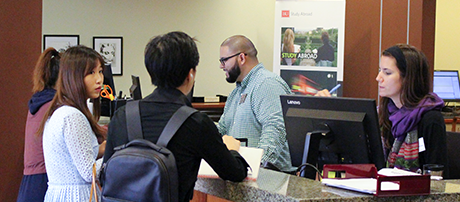Students on study abroad programs can generally expect to live in a community with fellow students, and are encouraged to embrace the housing standards of their host country. Each program page provides additional information on student housing, including information on physical accommodations, how meals are offered, and single-room availability.
Boston University Study Abroad is committed to working with students with disabilities who may need special accommodation to participate successfully in our programs. However, we cannot guarantee that facilities, technology, or support services will be available at each program location to the same extent as on the BU campus. If you are considering studying abroad and have a disability, please email Boston University Study Abroad at abroad@bu.edu as early as possible to discuss site-specific accommodation possibilities. BU Study Abroad works closely with BU’s office of Disability & Access Services, which evaluates requests for disability-related accommodations.
Types of Housing
Program Residences
Program Residences can be buildings owned or rented by BU Study Abroad and students can usually expect to live with other program participants.
At some of our sites, a limited number of single rooms may be available for an additional charge. If you are requesting a medical single, you must be approved through BU Disability & Access Services.
University Dormitories
Dorms are provided by a local university partner. Students can expect to experience communal living with other students, domestic or international, enrolled in the university or the study abroad program.
In certain locations, a limited number of single rooms may be available for an additional charge. If you are requesting a medical single, you must be approved through BU Disability & Access Services.
Please review individual program pages to see additional room information.
Local Homestays
Some programs arrange accommodations with host families. Homestays help students further develop language skills and adjust to life in a new country. Households chosen to participate in the program represent a wide range of incomes and situations. Students typically eat some meals with host families.
Housing Policy
Boston University Study Abroad participants are required to live in program-sponsored housing when the program fee includes the cost of housing.
Boston University Study Abroad participants may request an exception to this requirement if they reside with a family member whose primary residence meets the following requirements:
- The family member has resided at the location for at least 12 consecutive months immediately preceding the program start date;
- The residence is within a 45-minute commute of the host university/BU academic center or site office.
First-year students may request an exception to the housing requirement if they can meet the following requirements:
- They must reside locally with a parent, child, or spouse. A “parent” is defined as a person’s father or mother. In the case of legally separated or divorced parents, “parent” means either a parent with legal custody or a parent providing more than one-half of a student’s total financial support;
- The residence must be within a 45-minute commute of the host university/BU academic center or site office;
- The parent has resided at the location for at least 12 consecutive months immediately preceding participation in the first-year program.
To request to live with a family member as explained above, students must complete the Housing Exception Form, and submit the form via email to the Study Abroad Office (abroad@bu.edu) by the following deadlines:
- Fall semester/Academic Year participants: May 15
- Spring semester participants: October 15
- Summer term participants: March 15
Students whose housing exception requests are approved will receive a partial credit of the relevant Study Abroad Program Fee.
Students whose housing exception requests are not approved are required to live in program housing in order to participate in the program.



